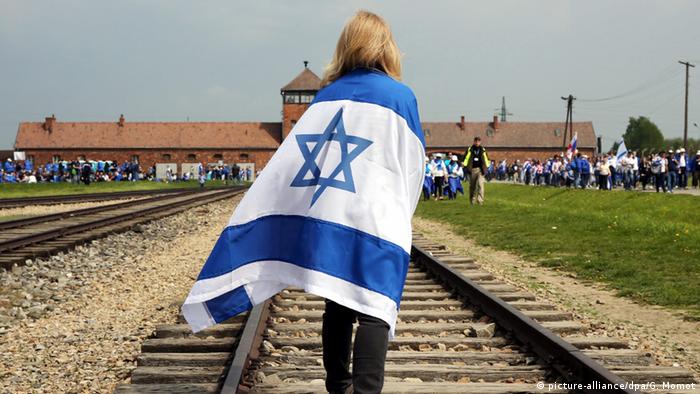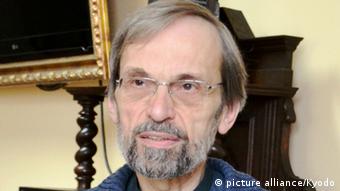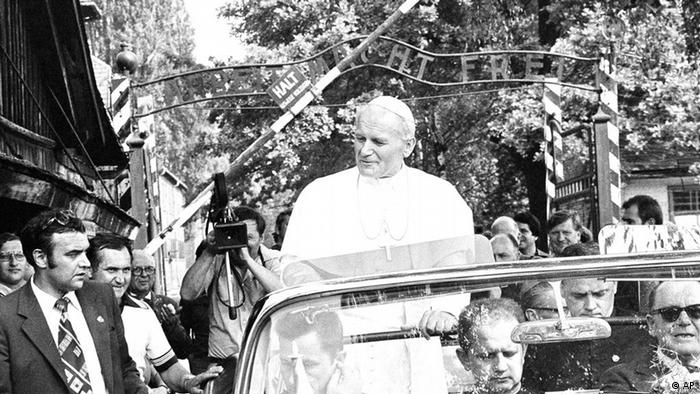Church
“Where was the mercy of God in Auschwitz?”
Around 300,000 young people from all over the world, the Auschwitz memorial and Museum visit currently-Birkenau. Manfred Deselaers is working as a pastor for over 25 years, in Oswiecim. Thoughts, to Evil, to the God question.

Over half a Million young people from all over the world gather in the coming days to 31. World youth day, the Catholic Church, the 26. July begins in Krakow. Around 300,000 of them want to visit the nearby former German concentration camp of Auschwitz-Birkenau. There Manfred Deselaers, a priest from Aachen lives, for over 25 years. The 61-Year-old works in the town of Oswiecim at the “centre for dialogue and prayer”, a meeting centre in the vicinity of the seemingly Unfathomable. In an Interview with Deutsche Welle, he commented on the forthcoming record-breaking number of visitors at Auschwitz and the Visit of Pope Francis.
DW: pastor Deselaers, for world youth day, hundreds of thousands of young people come to Krakow. The Auschwitz-Birkenau memorial and expected to be tens of thousands of young people. How should you approach this place?
Manfred Deselaers: Yes, very many groups want to take the opportunity to visit the memorial. We are expecting 30,000 people a day, so about 300,000 within ten days. In order to cope with such a quantity, is reduced, the possibility to visit. The actual exhibition in the Blocks, the houses are not accessible. There are Info sheets, and display boards with great photos and information. Otherwise we could not cope with so many visitors at all.
Such a short visit makes sense?
In any case, Yes. The tour through this authentic place, where all this really happened, touched always. Pope Francis stresses the atmosphere of silence and Contemplation in this place. And the teenager can feel and also learn, what happened there. But that’s why good is, of course, preparation is important. Therefore, we have set up for the Participants under www.sdm2016.cdim.pl a dedicated page. This place is also spiritual, it is to be Evil, guilt and forgiveness. What is man capable of? What are Nations? What is our responsibility? And: Where was God? Where was God then and where is he today? These questions are here in the air and touch the heart.
Auschwitz is “” for young people from other continents?

Priest Manfred Deselaers has been fighting for years for enlightenment
Do not underestimate the importance of Auschwitz in the world. The commemoration of the 70. Anniversary of the liberation of Auschwitz, one and a half years and was broadcast live on almost all over the world. Hardly a newspaper is not mentioned. Auschwitz is today a subject in the world. An example: In Argentina, the home of the Pope, it was not only for him but for the whole Church an important topic, because there is a relatively strong Jewish community with many Holocaust Survivors. Auschwitz is not just a European issue. What are we capable of? What is the abyss?…Touches people around the world.
The most famous pilgrimage will be on Friday, Pope Francis. He has already announced that in Auschwitz, just be quiet, to be silent.
You must always start with silence, you must listen to the voice of the earth. It says so in Poland. You have to shake out of this place. The slays first language. Pope John Paul II was growing up in the shadow of Auschwitz. Many of his friends were murdered there. The former concentration camp was then in his diocese. So he was prepared when he came as Pope to Auschwitz and there language. Pope, a biographical reference to this story had Benedict as a German, of course. But he wanted to silence the most, and he went silently through the whole of the main camp Auschwitz I. He then had to speak against the end of his visit as Pope, he said: “In this place the words fail, can, in fact, only shocked Silence”.

Pope John Paul II during his visit to the Auschwitz concentration camp
I feel that now, in the case of Francis this Silence. From this much larger distance – Francis comes here for the first Time – it is even more difficult to find the right words. Just given the size of the suffering. I am pleased to see that journalists now need to write about the Silence. When you do this. For the growing mass tourism here and the makes again clear that it is something like a Holy place. You have to take itself back. This Silence is the correct expression, because Silence, for Listening to open.
The youth should, therefore, silence in Auschwitz-Birkenau?
Yes, we hope this atmosphere for the young people is palpable.
The motto of Pope Francis is “mercy”. She is also the Motto of world youth day, the Catholic “year of mercy”. The fits to Auschwitz?
The first question that arises here is: Where was God in Auschwitz? First law: Where was the merciful God? Where was the mercy of God in Auschwitz? And we need to be careful to not move to fast answers, the wound in the relationship with God to fast, to take them seriously.
Now they live there for a good 25 years. How to take this matter seriously?
The ideology that built Auschwitz, the creators of Auschwitz, they have expressly rejected the doctrine of the mercy of Christianity. To them it was a question of strength in the culture of the fight. Against the Weak. That does not answer all the questions. Because it is happening in the so-called Christian Europe. And it is the Effort results in the redefinition of the Christian-Jewish relationship in the last 50 years. But – and this is on me – there is also a sign of mercy in Auschwitz. These are all the testimonials of people as prisoners, not monsters as the victims in this System of inhumanity. The man remained.
Symbol became father Maximilian Kolbe. Its sort of his life’s final act was an act of love for a fellow prisoner. And, ultimately, the SS had the last word, but the goodness of this priest. John Paul II has used the example of Maximilian Kolbe later, very often, to say: We need the Bad with the Good answers. Similar applies to sister Faustina (1905-1938), this Saint of the divine mercy from Krakow. In this sense, the mercy of God is also the answer to Auschwitz.
It has the in the core of the work in Oswiecim, near the Auschwitz-Birkenau?
In so many years and many encounters with former prisoners, I become deeper and clearer. These witnesses are, so to speak, the most Important thing. You are, if you take it seriously and make you feel taken seriously, often a very warm welcome. And the atmosphere, which is then developed in a very warm, human. That is to say: always with great care to deal with each other, for me, that is mercy. To me it is very important that the young people and all who come here, not leave here in a deep Depression. No. You should leave here with a positive mission: Believes that love is worth it. That mercy is worth it. Believes that, even if it costs a lot, it is not in vain, to be there for each other. This is the order I feel from the Survivors, from the voice of this earth. To make the world more human and more merciful. Hopefully, the young people feel that visiting here, in your heart.
Manfred Deselaers, a priest from Aachen, lives for over 25 years in the vicinity of Auschwitz. The 61-Year-old works in the town of Oswiecim, the meeting centre “centre for dialogue and prayer”.